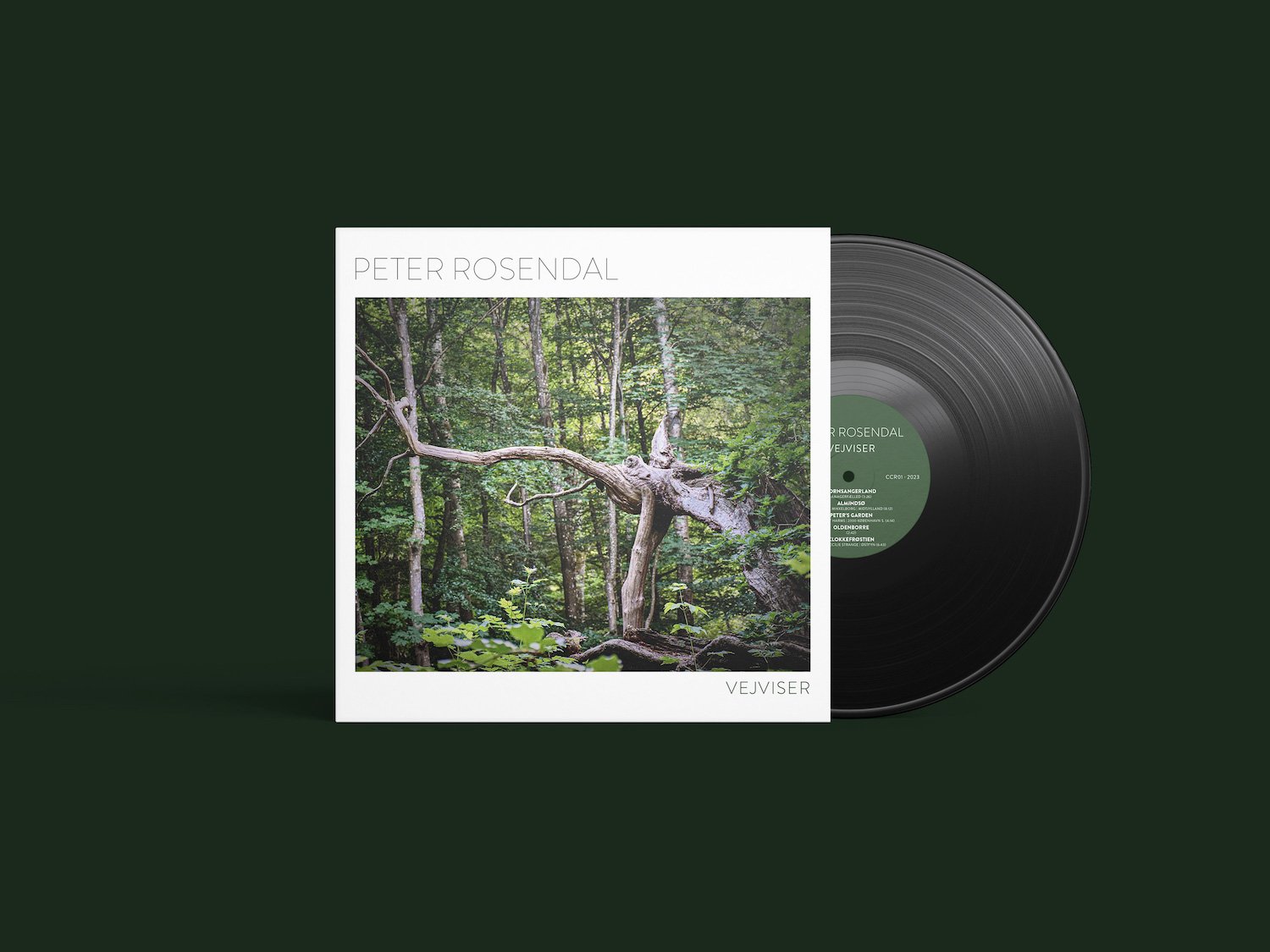
Let Us Become the Responsive Species!
In his latest release, 'Vejviser,' Peter Rosendal allows nature to speak.
Reviews:
“The Danish jazz composer and pianist has created nothing short of a stroke of genius.”
— Gaffa ☆☆☆☆☆ (5/6)
“A wondrous journey through nature… It’s beautiful, and it resonates deeply.”
— All That ☆☆☆☆☆ (5/6)
“You’ve definitely never heard anything like this before, and that’s meant as a wholehearted recommendation.”
— Kulturen.nu ☆☆☆☆☆ (5/6)
LET US BECOME THE RESPONSIVE SPECIES!
In his latest release, 'Vejviser,' Peter Rosendal allows nature to speak.
In a unique musical exploration of Denmark's nature, composer and jazz musician Peter Rosendal has created 'Vejviser' – a release that gives voice to nature. Through early morning walks around the country, Peter has recorded the raw sound of nature and transformed each area into a piece of music.
In the Danish language, the word 'Vejviser' carries a beautiful duality of meanings. On one hand, it can be translated as 'Wayfinder,' on the other hand, 'Vejviser' can also mean 'Road Folk Songs'.
Using his two pianos, a Steinway and a Hornung and Møller, Peter has improvised and drawn melodic lines from the richness of these landscapes, allowing his own personal sound to mirror and blend with the birds, frogs, and insects. At times, it's grand octaves, while at others, it's contrapuntal lines. The melodica acts as a kind of forest spirit, bringing essential insights to the music, while the flugabone adds warmth and balance.
Within this natural universe, Peter Rosendal has been joined by prominent musicians, including trumpeter Palle Mikkelborg, saxophonist Cecilie Strange, bassist Craig Earle, Canadian singer Nancy Harms, and producer Mads B. B. Krog.
The legendary trumpet player Palle Mikkelborg is best known for his collaborations with the iconic Miles Davis.
'Vejviser' is a musical symbiosis exploring the boundary between human nature and the nature of nature itself. What impact do other species have on our lives, and do these other species possess intrinsic value?
The album "Vejviser" will be released on November 17, 2023, on LP, CD, and digitally.
PETER ROSENDAL
With over 10 albums to his name, Peter Rosendal is a seasoned jazz artist who has earned multiple music awards, including the prestigious 'Jazz Album of the Year' title in Jazz Special for his previous release "Trickster".
Over the past two decades, Peter has been involved in numerous album releases for other artists and toured internationally as a pianist, performing with various jazz bands and renowned artists.
Let Us Become the Responsive Species
(LP liner notes by Carsten Jensen)
The elephant doesn’t want a trunk the length of a fire hose. The blue whale doesn't wish to become a kilometre long. Bigger is not always better. Nature knows boundaries: humans do not. It is our sick dream of eternal, relentless growth that has set us on a collision course with nature, bringing on global warming.
Not only are humans at the top of the food chain, but we are also responsible for the sixth mass extinction in the planet's history, wielding the same power and status as a geological catastrophe. We are waging an extinction war on a planet that is home to fewer and fewer species. We enclose nature, clothe it in the straitjacket of monoculture, and exhaust and exploit it until, reduced to our slave, it dies of overexertion. We call this barbarity progress, and the dictates of growth demand boundless production, performance, and overconsumption in an endless cycle, shaping each of us more deeply than any totalitarian state has managed to mould its subjects.
We have become estranged from the future. We can no longer envision it as a brighter time, a better world to look forward to. The future has become a dumping-ground for our unresolved problems, even though it is our children and grandchildren who are its shareholders, to use the reductionist language with which the all-dominant market economy has indoctrinated us. Our language suggests that Earth is ours, that we are its masters: not just supreme but superior beings in a hierarchical system we ourselves have invented.
If we look at the planet's biomass, we are insignificant. Of Earth's total biomass of 550 gigaton, humanity, with its eight billion inhabitants, accounts for one-tenth of a percent. Fungi weigh twenty times more than us and perform infinitely more useful work for the planet's survival than we do. Plants, bushes, weeds, grasses, and trees are the true heroes of the Earth, and if the intelligence of living beings were measured by their ability to survive, then they are what Darwin had in mind when he developed his theory of 'Survival of the Fittest,' not us.
We want to live safely, and well, and long. But we do not extend the same hope for the beings we share the planet with. Nature generously gave us everything, and we have responded with a chokehold called progress and development. Therefore, every day is a referendum on the future: Should we release our stranglehold on Earth or continue to tighten it? Will Earth die in our hands? Or should we breathe together?
So what should we do with our hands when we remove them from the Earth's windpipe? They must not rest idly. We must build a new and greener world, a slower, gentler, and more caring world. We must think of ourselves as the ancestors of the many generations ahead and not view the future as a landfill site for unresolved problems. We must be like the grandfather who plants a tree under whose shade he knows he will never sit. We must say, as the Apache Indians do: 'We do not inherit the Earth from our ancestors; we borrow it from our children.'
We deprive and degrade the Earth with our monoculture and artificial fertilisers. Nitrogen suffocates life in streams and lakes. The fish disappear from our fjords and oceans. Birds and insects fall silent. The elements are interconnected; earth, water, and the air, now filled with CO2 emissions from the arsonists in the still-dominating fossil fuel industry.
It's not about loving nature; it's about realising our deep connectedness with it. We humans are not unique creatures who can treat the Earth as our private property. The Earth belongs to the creatures who inhabit it, from microorganisms to whales in the ocean, and it's not just an aesthetic or emotional loss if the most prominent or beautiful species disappear. We are part of a necessary life cycle, an ecosystem of mutual interdependence that is capable of collapsing. The world we live in is like a vast coral reef, where every creature lives in mutual accordance and dependence, and when a coral reef fails, a chain reaction of death ensues.
We live in an intimate relationship with nature as a partner, but we confuse cohabitation with manipulation. We know far too little about the nature we depend on. The more control we have gained over it through increasingly advanced technology, the less we seem to know about it, and now we are paying a terrible price for that ignorance.
Let us become the responsive species and recognise that even what happens far from our gaze, in a dense forest, beyond a mountain range, or under the floorboards, has a message for us. Clouds have a grammar, the sun is an exclamation mark, rain is a tale, and the end of the story is also about us.
Let us cultivate the elevated qualities we can find in every tree, such as necessary resistance, peaceful courage, energy, seriousness, and persistence. Let words and music be the fifth element, along with earth, fire, water, and air. Let us use them to discover, journey, understand, reconcile, and be reconciled.
Imagine that the flowers of the Earth welcome us, and that something new sprouts inside us. Imagine the return of the stars in a night sky that speaks to us again. Imagine that we hear galaxies sing a lullaby for Earth. Just imagine for a moment that we learn to listen, and realise that the fruit of wisdom is the simple understanding that the world is not ours.
Track list
1. TORNSANGERLAND
(Amagerfælled)
2. ALMINDSØ FEAT. PALLE MIKKELBORG
(Midtjylland)
3. PETER’S GARDEN FEAT. NANCY HARMS
(2300 København S.)
4. KLOKKEFRØ STIEN FEAT: CECILIE STRANGE
(Østfyn)
5. KONGEEGEN
(Jægerspris Nordskov)
6. SKIBSTED FJORD
(Thy)
7. MOLS BJERGE
8. OLDENBORRE
9. IDES TRIANGEL
(Salling)
Album Credits
Peter Rosendal: Nature Recordings, Upright Hornung and Møller, Upright Steinway, Wurlitzer, Flugabone, and Melodica.
Palle Mikkelborg: Flugelhorn and trumpet on A2.
Nancy Harms: Vocals on A3.
Graig Earle: Bass on A3.
Cecilie Strange: Tenor saxophone on A4.
Composed, recorded, produced, mixed, and mastered at Casa Dos Figos and Creative Cph Studio by Peter Rosendal and Mads B. B. Krog Mossin.
A3: Composed by Nancy Harms, Peter Rosendal, and Mads B. B. Krog Mossin.
Cover Photo: Peter Rosendal.
Cover Design: Christina Carlsen / Eks-Skolens Grafisk Design & Tryk.
Thanks to: Bettina Rosendal Kurth, Lars Vissing, Mads Mathias, Jonas Johansen, Siff Cecilie Mossin, Agnete Nyboe Høst, Jan Randrup, Bodil and Ole Rosendal, Henrik Fuglesang, Matt Fripp, Mettelise Larsen, Lisbeth Beyer Mogensen, Carsten Jensen, Mads BB, Palle Mikkelborg, Nancy Harms, Cecilie Strange, Graig Earle, and Lívia Soares.
© ® 2023 Creative Cph. Records
TRACKLIST AND INFO IN ENGLISH
01 WHITETHROAT LAND
An area on Amager Fælled (in Copenhagen), nestled against the old beach meadow.
Here, the Nightingale takes the lead.
Unfortunately, this habitat has since the recording took place been destroyed and transformed into a construction site.
02 ALMINDSØ
A deep groundwater lake surrounded by woodland in the middle of Jutland (Denmark).
Its remarkably pure and clear waters allow you to sense the fish swimming around when you take a dip.
Renowned trumpeter Palle Mikkelborg makes a guest appearance, lending his characteristic whimsical and airy tones.
03 PETER'S GARDEN
Peter's garden on Amager (Copenhagen), home to sparrows, doves, greenfinches, and blackbirds.
Canadian jazz singer Nancy Harms vividly captures the essence of a summer's day in the garden through her melodic words.
04 THE FIRE-BELLIED TOAD PATH
Small, delicate ponds along the eastern coast of Funen (Denmark).
You can hear the frogs in the distance, resembling tiny bells.
Danish saxophonist Cecilie Strange joins in harmony with the frogs.
05 KING'S OAK
Northern Europe's oldest tree, estimated to be nearly 2000 years old.
It stands hidden in the dense old forest somewhere in Jægerspris Nordskov (Denmark).
The time is 4 in the morning, and the forest is teeming with life, with light raindrops and buzzing insects.
06 MOLS MOUNTAINS
One of Denmark's most diverse natural landscapes.
07 SKIBSTED FJORD
One side of the inlet “Limfjorden” with large hills descending towards the water.
This is where the viking king Knud the Holy assembled his fleet for the ill-fated final attack on England, marking the end of the Viking Age.
08 COMMON EUROPEAN COCKCHAFER
A large, buzzing beetle with powerful flight.
09 IDE'S TRIANGLE
Inspired by the chapter on Jakob and Ide from "Kongens Fald" (The Fall of the King).
Their journey, starting in Salling, takes them around the country of Denmark during the bright months.
The sounds include the call of the lapwing, cuckoo, and finally, the raven.

